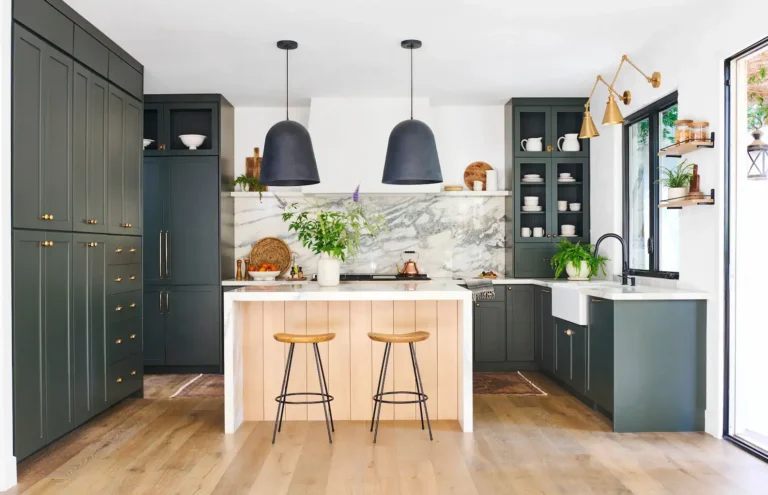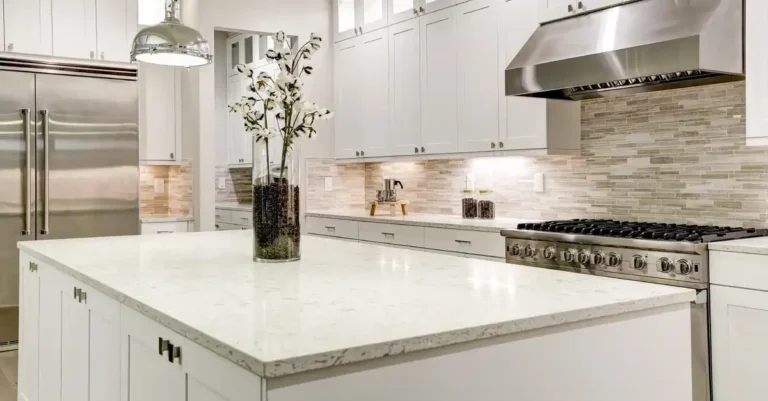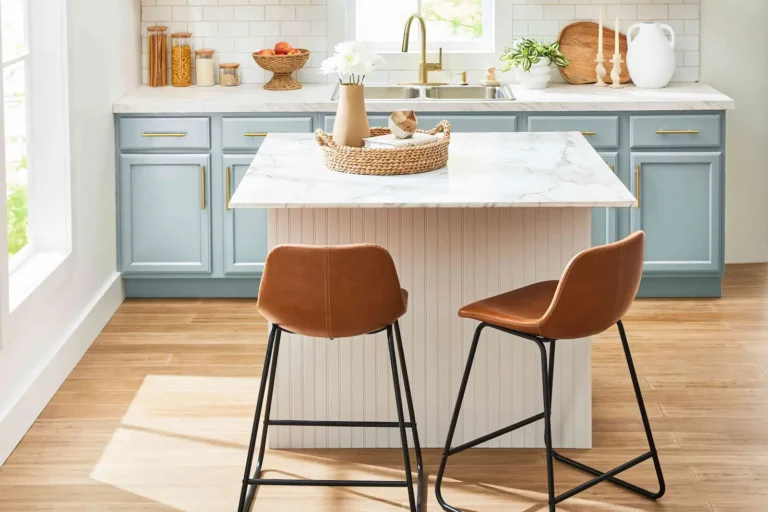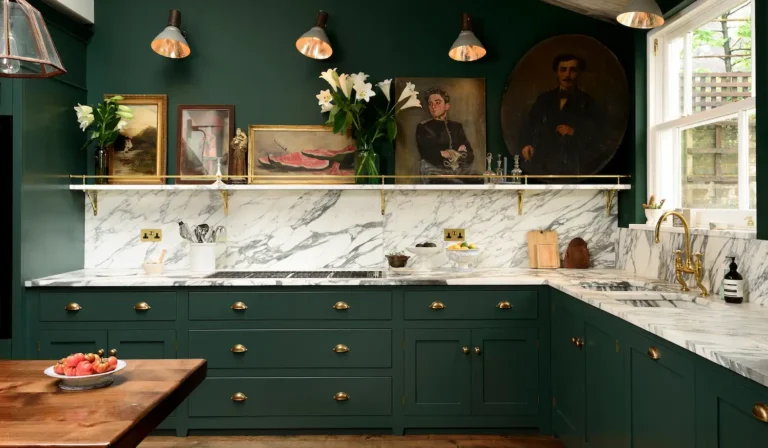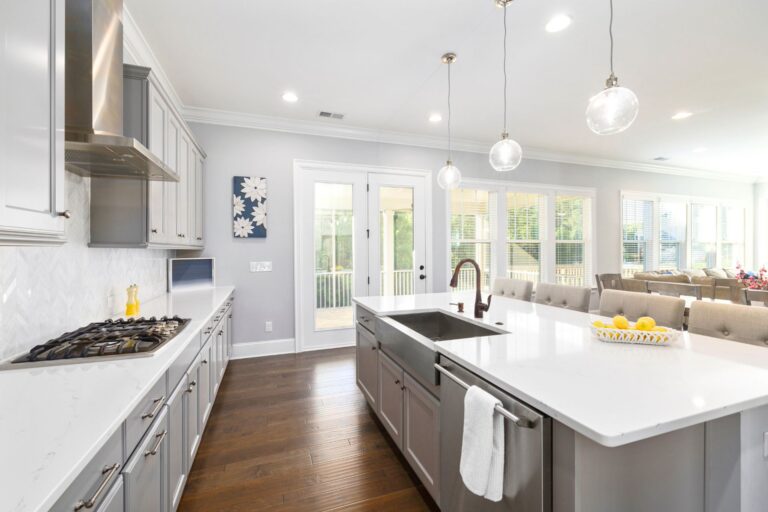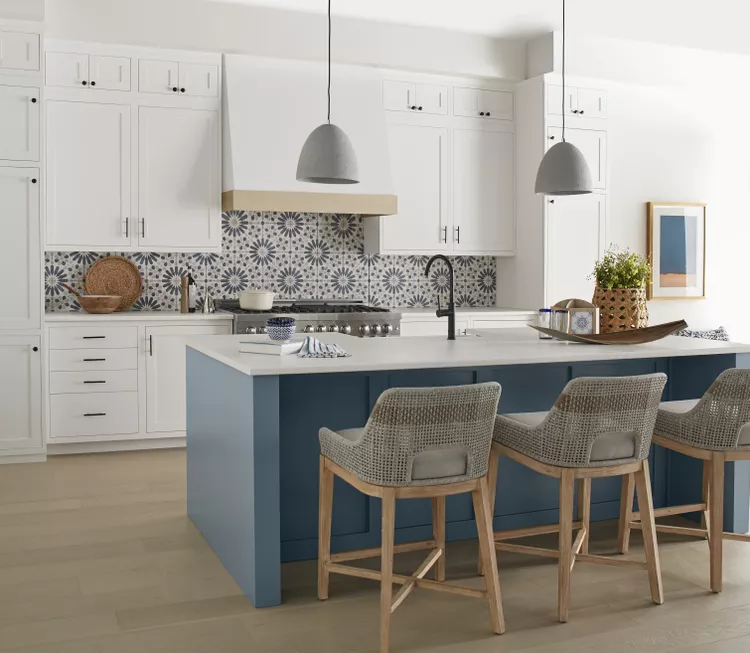When remodeling your kitchen, you must know many things, including countertops. The material for the countertop is one of the most crucial decisions you need to make when reconstructing your kitchen. Your kitchen’s countertop affects how it looks and how well it functions and endures normal wear and tear. Cooking can be more fun and valuable when you have a strong countertop in your kitchen and house. When choosing a countertop, durability should be your first consideration because they are under harm, including spills, hot pans, and scratches. It’s important to ensure your countertop lasts a long time because that will ensure you can use it for many years.
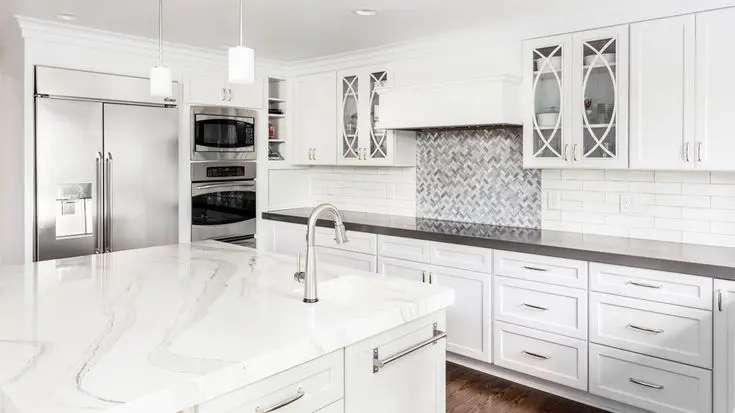
You’ll need countertop ideas to update your kitchen or upgrade a kitchen island. Unlike choosing kitchen cabinets, which can be guided largely by style, selecting a countertop requires equal attention to durability, maintenance, and appearance. Kitchen countertops significantly impact the space, so their visual impact is crucial.
This article aims to help you choose the most durable countertop for your home based on the best natural and engineered materials.
Quartz Countertops
When it comes to replacing or renovating your countertops in your kitchen, Quartz is the best option for durability since it blends natural stone with artificial elements. Although crushed quartz and resin countertops are more durable than natural stone, they can have solid colors or look like granite. Because of this, quartz is a good material for wet areas like kitchens and bathrooms. Engineered quartz is currently the most durable material for home remodeling. Due to its crystalline structure, it has a glossy, shiny finish, is cool to the touch, and has a smooth surface resistant to chipping and cracking.
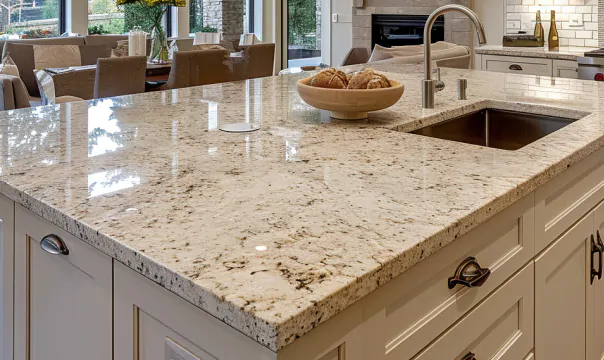
Cost
Labor and supplies should be budgeted approximately $4,500 since quartz is an expensive countertop surface material. Pricing ranges for small kitchens with less expensive quartz countertops start at $1,500 and go up to $8,000 for larger kitchens with better components.
Pros
You don’t need to worry about damage; you can chop food on them or set hot foods straight on the surface. Furthermore, because quartz is transparent, further sealing is unnecessary because liquids won’t seep. The surface is stunning due to its superb variety of colors, designs, and textures, combining pure stone’s beauty with increased strength and durability.
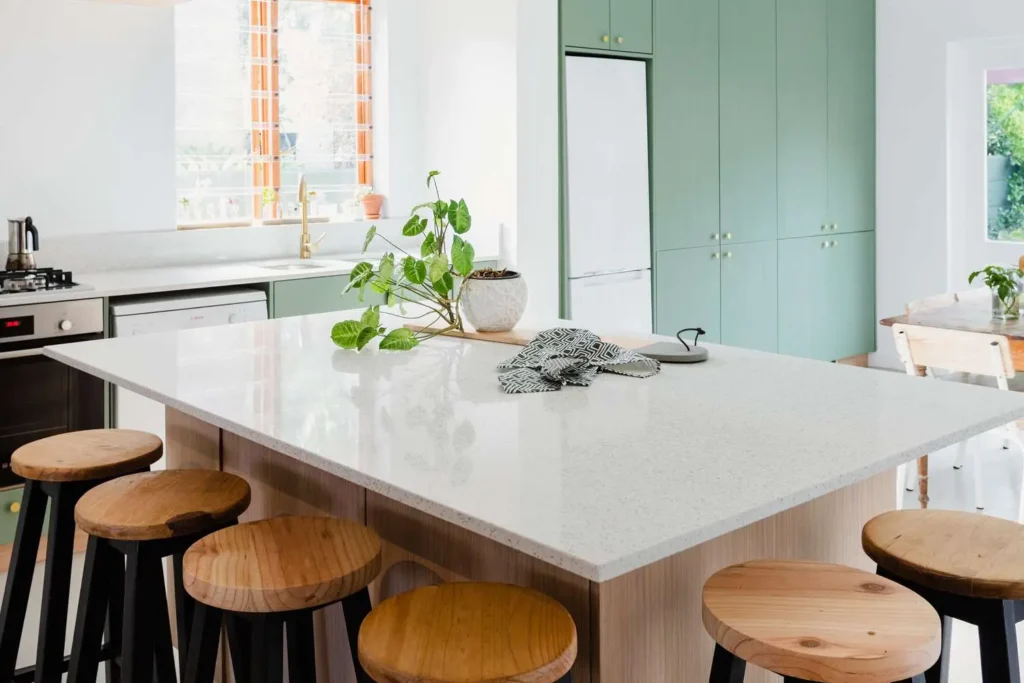
Cons
Quartz countertops can be expensive, and compared to less expensive materials like granite or crushed glass, they are less heat-resistant. The seams might indicate that quartz will eventually fade in direct sunlight if you choose lighter colors. Furthermore, quartz’s sleek, contemporary appearance can feel chilly, making it less suitable for a classic kitchen.
Granite Countertops
Most people consider granite one of the most durable materials for countertops. It’s a very adaptable stone that doesn’t need a lot of extra maintenance, much like quartz. Granite is an increasingly popular material for bathrooms and kitchens because of its strength and beauty. According to a National Association of Realtors survey, granite continues to be a top need for purchasers. Its striking natural beauty fits any kitchen design with ease.
Granite is a naturally occurring element that is both hard and heat-resistant. However, it is also porous, absorbing water at 0.05–0.17%. This means regular sealing is essential to preserve its beauty and stop bacteria from growing on the surface.
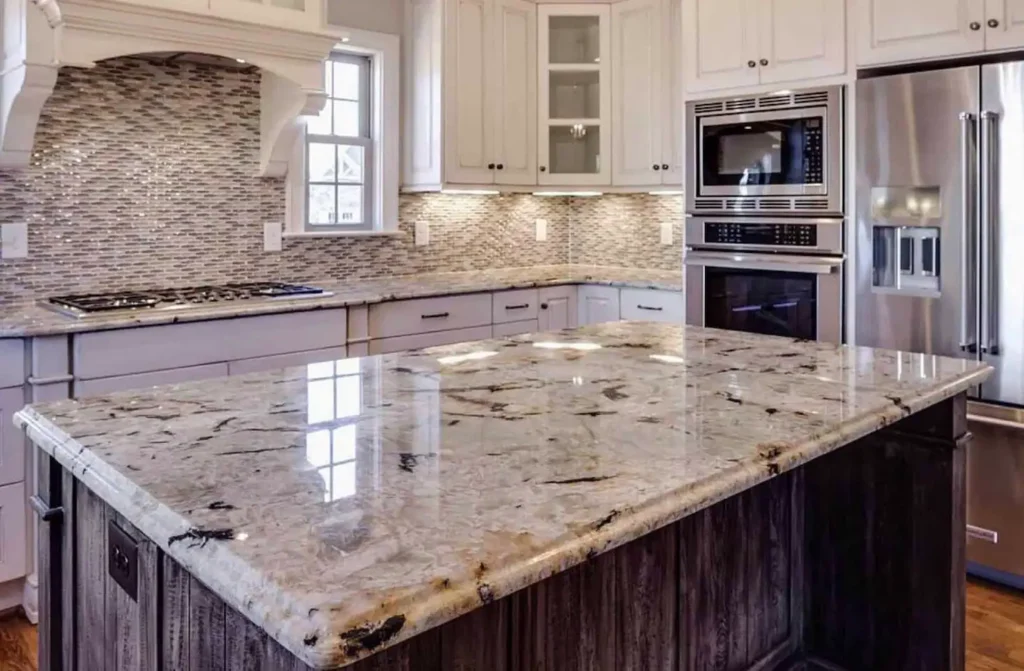
Granite is a versatile stone with many lovely hues and intriguing textures. You may combine your granite countertop with other granite accents in your house to create a long-lasting and useful solution that gives your area a touch of elegance and functionality. Furthermore, Granite countertops require professional installation. Experts can precisely measure your kitchen and provide flawless stove cuts, ensuring a high-quality outcome.
Cost
Granite countertops normally cost between $2,000 and $4,500*, with an average cost of approximately $3,000, including labor and materials. The size of your kitchen, the thickness of the granite, and the rarity of the granite variety can all affect the total cost.
Pros
Granite is an extremely durable material that protects countertops against damage and cracks. Hot pots and other warm objects can be placed on it without fear of damaging the surface. Sealing your granite annually will also shield your countertop from stains.
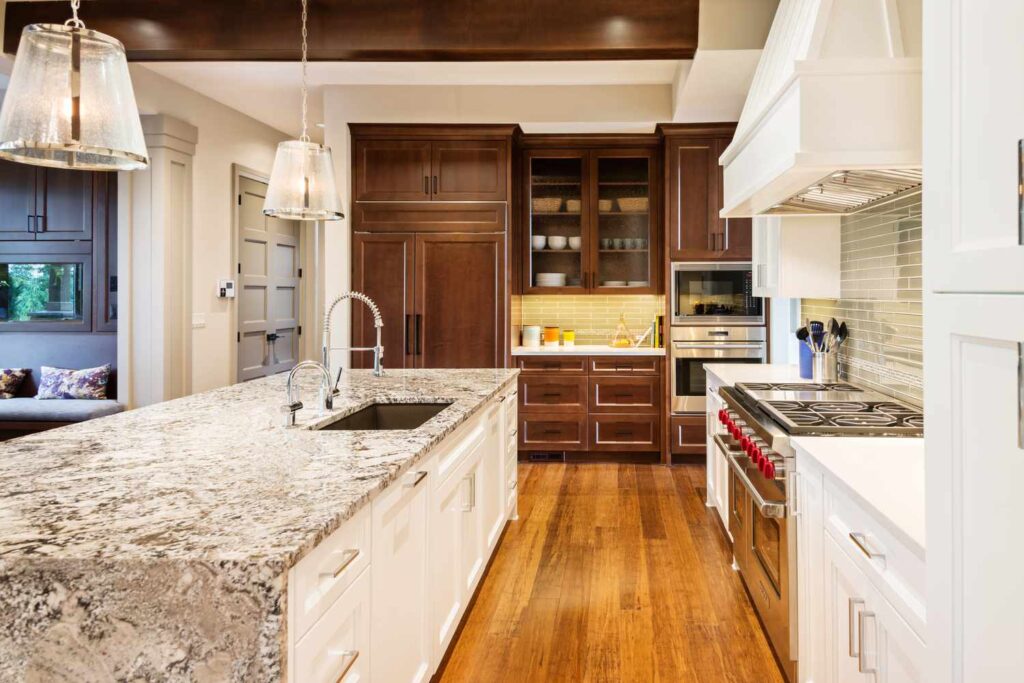
Cons
Granite is indeed a durable material, but there are some important facts to know. For example, if oil spills on a granite countertop, it can be hard to remove the stain. You may need to use a special solution to get it out. Granite can be unpredictable in terms of design. Natural variations in the stone can cause countertops to look different from the sample you saw. Additionally, it can be challenging to hide seams in granite countertops, so it’s important to plan their placement carefully.
Solid Surface Countertops
This durable kitchen countertop is a great alternative to natural stone. The typical solid choice is acrylic or polyester with natural ingredients like pigments or minerals. The solid surface is simple to clean because of its impermeable nature and lack of seams, making the task quick and straightforward. Moreover, sealing is not necessary.
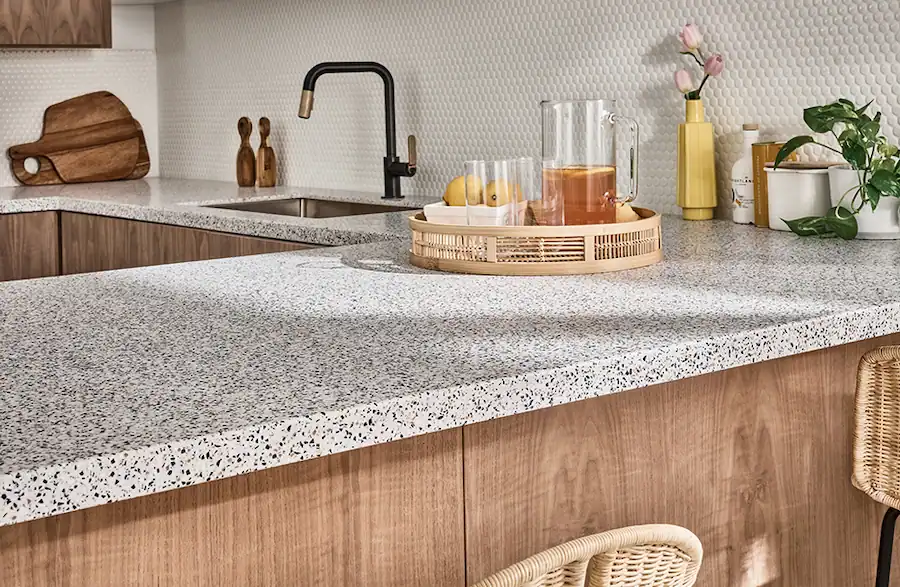
Cost
Solid-surface counters can cost from $1,500 to $6,000, depending on the design and size of the kitchen. The thinnest, 1/4-inch-thick countertops have the lowest prices.
Pros
Solid surfaces come in different forms. They are non-porous and don’t need any particular sealers or cleaners. Sanding away scratches is easy. They can be shaped to include a natural-looking backsplash or a separate sink bowl.
Cons
A solid surface is less durable because it can melt or burn if exposed to heat.
Laminate Countertops
Laminate countertops are a reasonably priced artificial alternative for kitchens and bathrooms. Particle boards are covered with layers of plastic to create strong, solid, and water-resistant laminate countertops. As opposed to stone, laminate is now less common than it used to be.
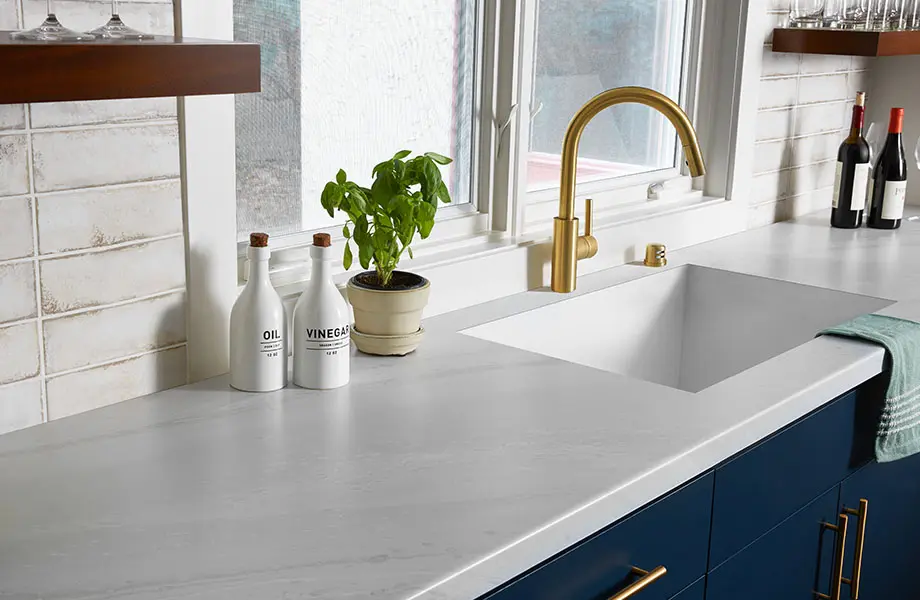
Cost
At an average of $1,240, laminate is a more affordable countertop option than stone. Here are some other affordable countertop options for you. If homeowners are handy with DIY projects, they may install laminate countertops themselves and further reduce the expense of updating their kitchen.
Pros
This product is like a chameleon; it can seem like granite or wood, and the pricing is right. It is stain-resistant and doesn’t require any additional cleaning or sealants.
Cons
Compared to other materials, laminate countertops are more likely to crack, scrape, and burn and more difficult to repair. In addition, research conducted by some home builders indicates that most buyers do not favor purchasing homes with laminate counters.
Tile Countertops
Tile countertops are quick to install for self-builders. If you want a kitchen countertop that is easy to install and long-lasting, tiles are your best bet. Because tiles are so versatile, it’s easy to customize your kitchen workspace to suit your tastes. There are countless design options. You are free to choose any color, design, or texture. Furthermore, tiles are one of the less expensive countertop options that can help you save money.
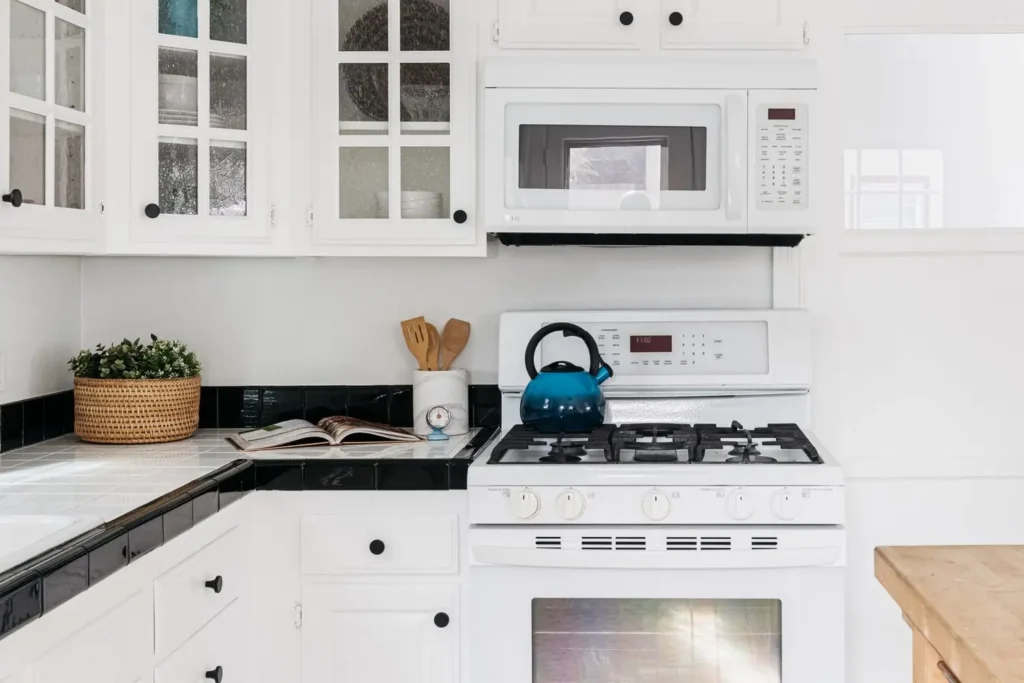
Cost
Tile counters are among the most affordable and long-lasting countertop options. They may be installed for $20 to $40 per square foot.
Pros
The tile is easy to clean and long-lasting. The material is resistant to cuts, stains, and heat. Furthermore, tile cracks can be easily repaired. The color and pattern of the tiles are also endless. You can create a unique counter by combining different elements.
Cons
The tile breaks easily if pots and pans are accidentally dropped on it. Because of its uneven surface, glasses, cutting boards, and plates can all become unstable and wobble. You cannot roll out dough on a tile countertop, unlike stone surfaces. Grout lines are also easy targets for dirt and grime, which means that if you don’t seal them annually, bacteria will have a perfect place to grow.
Marble Countertops
Marble is a luxurious stone material frequently used in houses because of its natural brightness. If you want to give your home’s interior more class and elegance, marble stone is a fantastic choice. But in moist places, it needs extra attention and upkeep. This natural substance can only endure so long as it receives the right maintenance. Like other natural stones, marble must be sealed regularly to prevent rust and bacteria from growing on its surface. There are endless patterns available to you, so you can choose the one that best matches your tastes. Marble is one of the most expensive countertop materials, but its worth cannot be disputed.
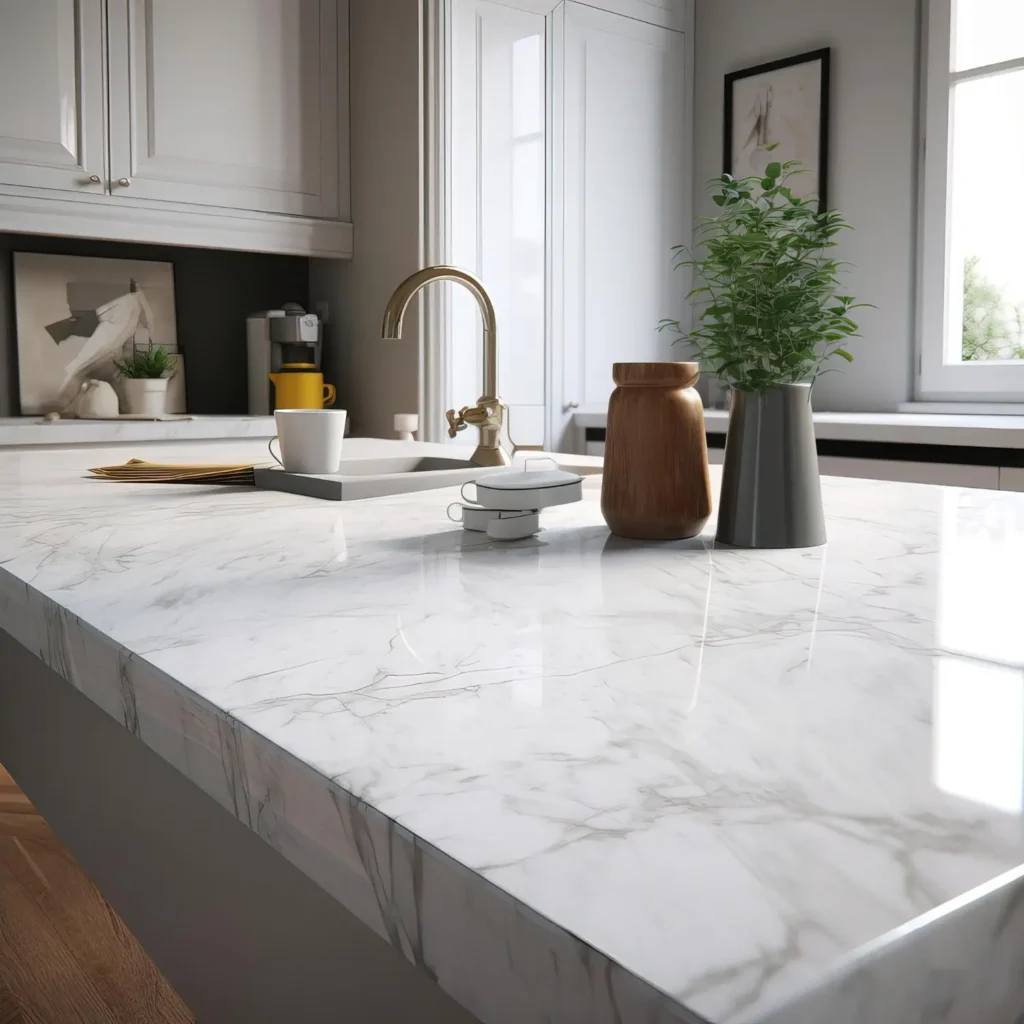
Cost
The average cost of installing a marble countertop is $3,000, but it can be as much as $15,000 in certain cases. Numerous elements, including labor, materials, marble thickness, edge design, and rarity, could influence the ultimate cost. Because of this, many individuals choose stones that approximate marble but are less expensive and require less maintenance.
Pros
Marble gives your kitchen a classy and luxurious look. It is heat-resistant and comes in a wide range of patterns and colors.
Cons
While marble has many benefits, it can easily become stained, scratched, or chipped.
Stainless Steel Countertops
Stainless steel has long been used in professional kitchens, making it popular. It is a popular choice for kitchen countertops due to its sleek, modern appearance, remarkable durability, and corrosion resistance.
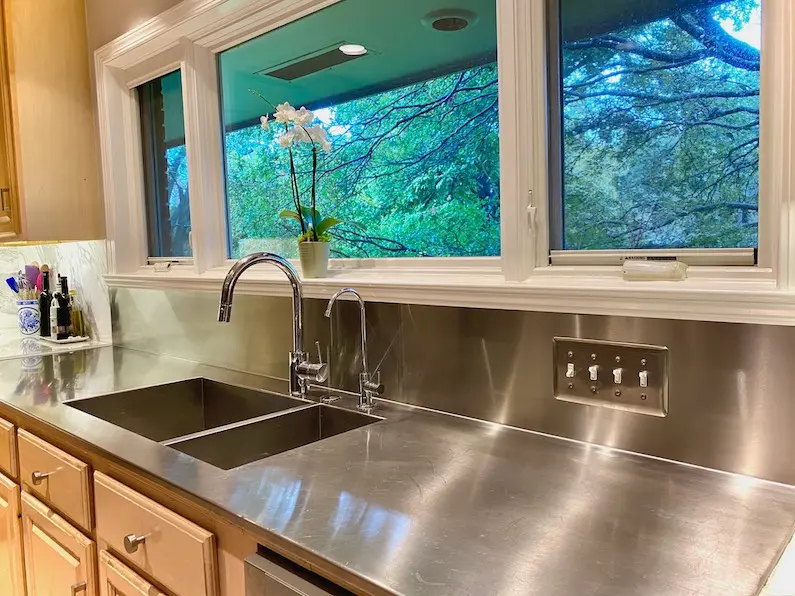
Cost
Stainless steel is one of the more expensive countertop materials, with installation costs ranging from $55 to $120 per square foot.
Pros
Its extremely heat-resistant and non-porous surface makes it easy to maintain and clean, making it the perfect choice for kitchen spaces.
Cons
Although stainless steel counters resist dents, they can be damaged when cutting heavy objects.
Concrete Countertops
We also have concrete, a mix of cement, water, and other materials for a strong kitchen countertop. Concrete is a popular material for countertops because of its sleek and modern appearance, which goes well with many different kitchen designs. It is a beautiful, durable material that looks fantastic in the kitchen. Whether you want to create a more traditional area or a sleek modern kitchen, concrete countertops allow you to reach your design goals.
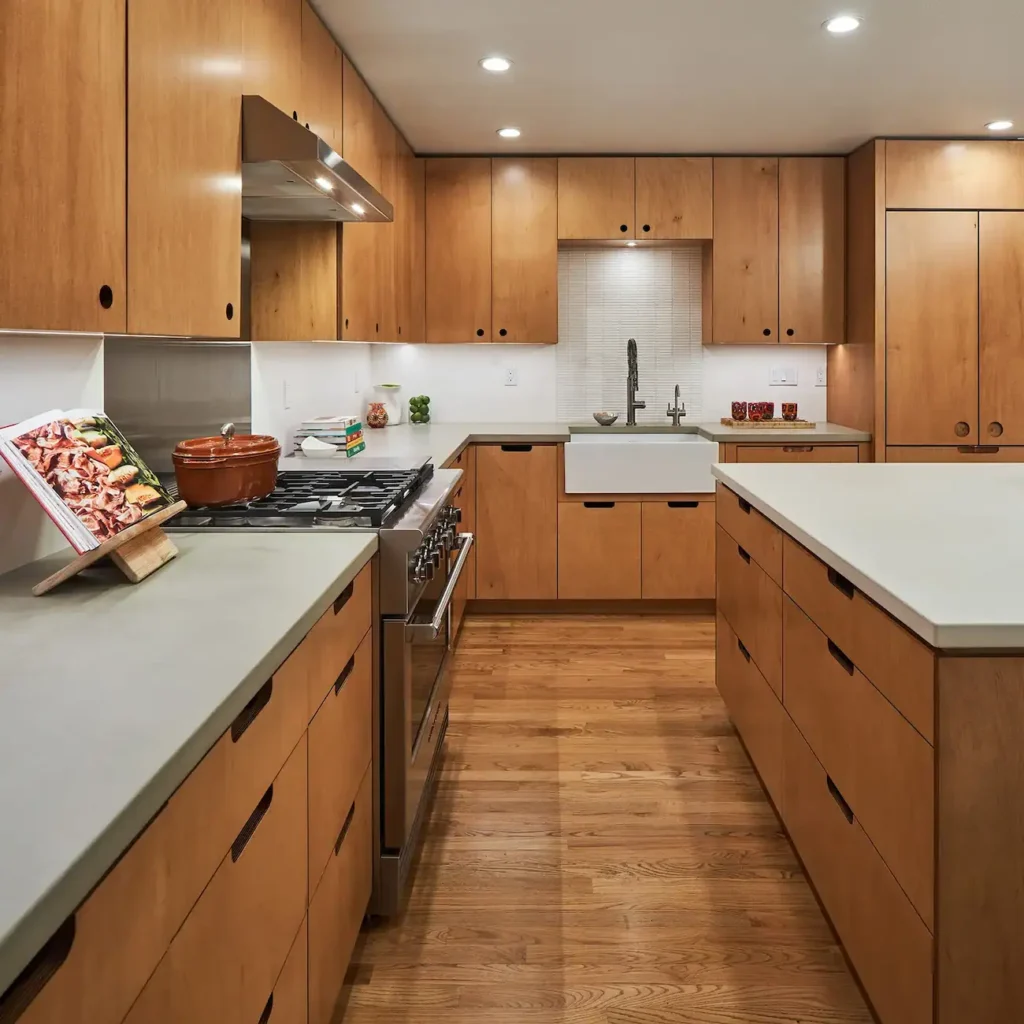
Cost
Concrete countertops look comparable to quartz and granite, although they are usually less expensive. Installing concrete countertops in a kitchen can range from $40 to $100 per square foot.
Pros
Concrete is a durable material that lasts, gives your kitchen a modern look, and can absorb a lot of heat. One of the key advantages of concrete countertops is their low price.
Cons
Concrete countertops are heat-resistant, but liquids can stain their surface. Therefore, they should be carefully maintained with a sealant to keep them in good condition.
Soapstone Countertops
Soapstone countertops offer a beautiful look and feel very smooth and silky to the touch. This type of stone is used in baby powders and countertops. It looks great and maintains its beauty with regular oiling.
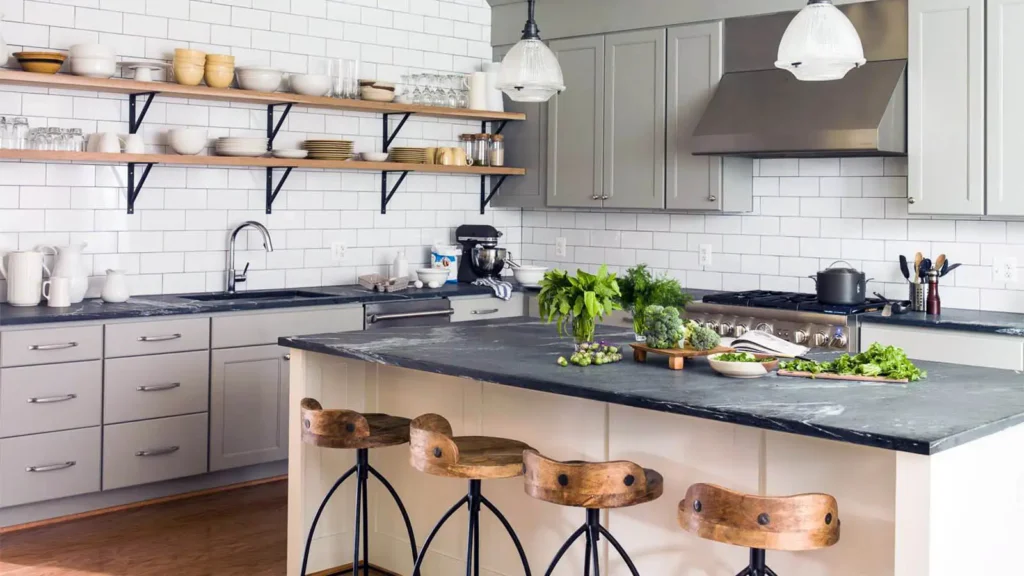
Cost
Compared to granite or quartz countertops, soapstone countertops range from $75 to $120 per installed square foot.
Pros
In addition to being visually striking and resistant to chemical reactions, soapstone surfaces are heat-resistant. This is because they have long been used in science labs.
Cons
Soapstone countertops can scratch easily, and their color tends to change over time, which is a downside to consider.
Wood Countertops
Wood is one of the most popular materials for kitchen counters because of its inherent warmth and aesthetic appeal, which create a cozy and welcoming atmosphere. Black walnut, white oak, acacia, maple, and other hardwoods can all be used to make wood countertops. All varieties rank highly on the Janka scale, comparable to the Mohs scale for mineral hardness. Sustainable, organic wood countertops are the only ones that last for a long time.
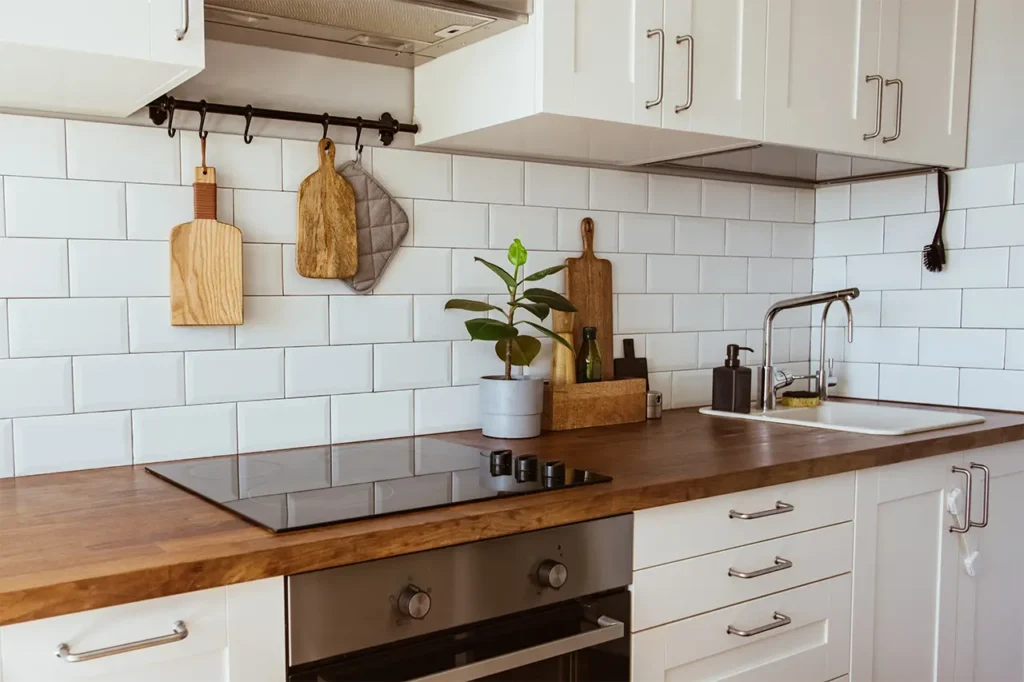
Cost
Depending on the wood variety you select, wood countertops can cost as little as $15 per square foot or as much as $150 per square foot.
Pros
Wood naturally resists harmful bacteria and is soft on blades, so it’s also a great option for food preparation.
Cons
Compared with solid surfaces, wood countertops are prone to scratches and must be sealed frequently to guard against water damage.
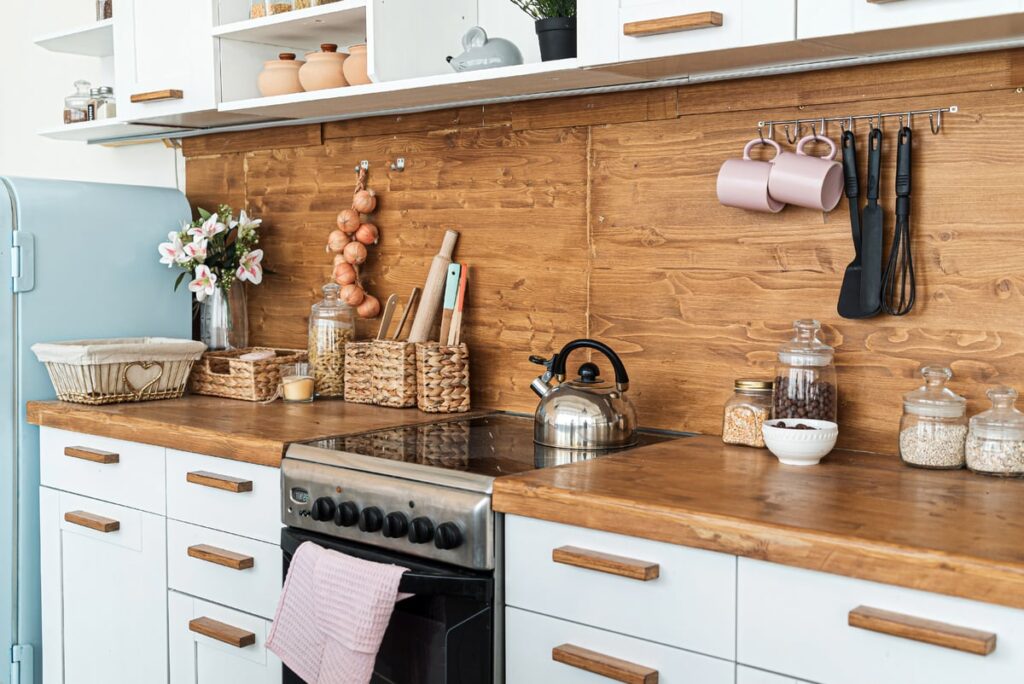
Frequently Ask Questions
What is the most durable countertop?
Quartz is the most durable countertop material. It is composed of stone and resin and is strong, water-resistant, and scratch-resistant. Quartz only requires a little upkeep and can survive very long.
What is the more durable, Quartz or Granite?
Quartz countertops are more durable than granite ones because the binders in the engineered stone help prevent cracks and scratches.
How do I choose the right countertop material?
Each countertop is ideal for some types of homes. The ideal material for your kitchen will depend on several factors, including color, overall style, durability, and stain and scratch resistance. When selecting the right countertop material for your area, consider each factor.

